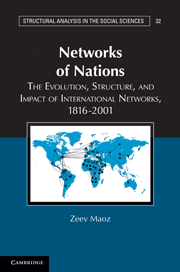Book contents
- Frontmatter
- Contents
- Preface
- Part I What Are International Networks?
- Part II The Formation of International Networks: Theory and Evidence
- 5 Networked International Politics: A Theory of Network Formation and Evolution
- 6 Testing the Theory of Networked International Politics
- 7 Nations in Networks: Prestige, Status Inconsistency, Influence, and Conflict
- Part III The Implications of the Networked International Politics Theory
- Glossary
- Bibliography
- Author Index
- Subject Index
5 - Networked International Politics: A Theory of Network Formation and Evolution
Published online by Cambridge University Press: 05 June 2012
- Frontmatter
- Contents
- Preface
- Part I What Are International Networks?
- Part II The Formation of International Networks: Theory and Evidence
- 5 Networked International Politics: A Theory of Network Formation and Evolution
- 6 Testing the Theory of Networked International Politics
- 7 Nations in Networks: Prestige, Status Inconsistency, Influence, and Conflict
- Part III The Implications of the Networked International Politics Theory
- Glossary
- Bibliography
- Author Index
- Subject Index
Summary
Introduction
The concept of emergence in complexity theory refers to “the arising of novel and coherent structures, patterns and properties during the process of self-organization in complex systems” (Goldstein, 1999). The characteristics of emergent systems include (a) radical novelty (features not previously observed in the system); (b) coherence or correlation (meaning integrated wholes that maintain themselves over some period of time); (c) a global or macro level (i.e., there is some property of “wholeness”); (d) evolution – it is the product of a dynamical process; and (e) it is ostensive – it can be perceived (Corning, 2002: 25).
Many phenomena and structures in international relations are emergent systems. These include global wars or global warming, the rise and decline of imperialism, the rise and decline of norms and institutions, bipolarity and multipolarity. However, it is often unclear how these phenomena emerge, function, and evolve. Corning (2002: 18) suggests that “reductionism, or detailed analysis of the parts, and their interactions is essential for answering the ‘how’ question in evolution – how does a complex living system work? But holism is equally necessary for answering the ‘why’ question – why did a particular arrangement of parts evolve? In order to answer the ‘why’ question, a broader, multi-leveled paradigm is required.”
- Type
- Chapter
- Information
- Networks of NationsThe Evolution, Structure, and Impact of International Networks, 1816–2001, pp. 147 - 185Publisher: Cambridge University PressPrint publication year: 2010



